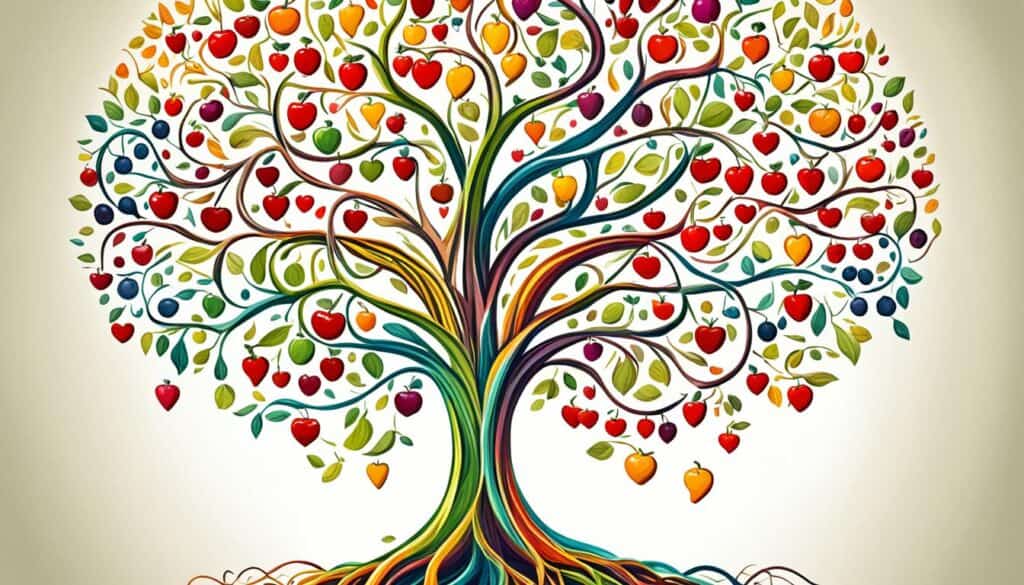What if I told you that cultivating a forgiving heart can bring about incredible rewards in your life?
Rewards that go beyond mere personal satisfaction and extend to your health, peace, joy, and faith.
Sound too good to be true?
Let’s delve into the teachings of Matthew and uncover the transformative power of forgiveness.
Matthew, one of the four Gospels in the Bible, offers profound insights into the significance of forgiveness. These teachings show us how letting go of grudges and embracing forgiveness can lead to a more fulfilling and purposeful life.
Are you ready to explore the incredible rewards that await when you cultivate a forgiving heart? Join us as we journey through Matthew and uncover the transformative power of forgiveness in your health, peace, joy, and overall journey of faith and life.
Inner Peace and Freedom: Breaking Free from Resentment
Matthew 18:21-22 emphasizes the importance of forgiveness, revealing that harboring resentment can bind us internally. By embracing forgiveness, we can break free from the chains of anger and bitterness, fostering a sense of inner peace and emotional liberation. Ephesians 4:31-32 further supports this notion of letting go of negative emotions and embracing forgiveness.
“Then Peter came to Jesus and asked, ‘Lord, how many times shall I forgive my brother or sister who sins against me? Up to seven times?’ Jesus answered, ‘I tell you, not seven times, but seventy-seven times.'”
In these verses, Jesus teaches us that forgiveness is not a limited resource. It is a transformative power that liberates us from the burdens of resentment and grudges. When we choose to forgive, we open ourselves to inner peace and the freedom to live without the weight of past grievances.
Resentment can consume our thoughts and drain our energy, hindering our ability to experience true joy and fulfillment. It traps us in a cycle of negativity, preventing us from moving forward and embracing the present moment. However, when we release resentment through forgiveness, we create space for emotional liberation, allowing us to live more fully and authentically.
Letting go of negative emotions and practicing forgiveness is not always easy, but the rewards far outweigh the difficulty. By forgiving others, we not only free ourselves from the bondage of resentment but also open the door to deeper, more meaningful connections with others and ourselves.
Embracing Forgiveness: A Path to Inner Healing and Liberation
Ephesians 4:31-32 reminds us to “get rid of all bitterness, rage, and anger, brawling and slander, along with every form of malice. Be kind and compassionate to one another, forgiving each other, just as in Christ God forgave you.” This verse highlights the transformative power of forgiveness in cultivating inner peace and freedom.
Forgiveness is a gift we give ourselves, enabling us to let go of resentment and embrace compassion. It allows us to heal emotional wounds, release negative energy, and experience personal growth. When we choose forgiveness, we not only liberate ourselves but also contribute to a more harmonious and empathetic world.
By integrating the teachings of Matthew 18:21-22 and Ephesians 4:31-32 into our lives, we can break free from the chains of resentment, experience emotional liberation, and cultivate a heart filled with inner peace and freedom.
Improved Relationships: The Key to Authentic Connections
In our journey of life, relationships play a vital role in shaping who we are and how we experience the world. Whether it’s with family, friends, or colleagues, the quality of our relationships can greatly impact our overall well-being and happiness. That’s why it’s essential to cultivate improved relationships that are built on a strong foundation of forgiveness and reconciliation.
Matthew 5:23-24 reminds us of the significance of reconciliation and forgiveness in healing and restoring our relationships. It states, “Therefore, if you are offering your gift at the altar and there remember that your brother or sister has something against you, leave your gift there in front of the altar. First, go and be reconciled to them; then come and offer your gift.” This scripture emphasizes the importance of resolving conflicts and seeking forgiveness before approaching God with our offerings.
When we choose to forgive, we open the door to healing, allowing us to mend broken bonds and foster authentic connections with others. Forgiveness serves as the catalyst for rebuilding trust, understanding, and a sense of harmony. It paves the way for vulnerability and empathy, creating an environment where relationships thrive.
Colossians 3:13 further reinforces the significance of forgiveness in nurturing harmonious relationships. It advises, “Bear with each other and forgive one another if any of you has a grievance against someone. Forgive as the Lord forgave you.” This verse encourages us to extend the same forgiveness that we have received from God to those around us. By doing so, we create an atmosphere of grace and understanding, where conflicts are resolved, and relationships are strengthened.
| Benefits of Improved Relationships through Forgiveness and Reconciliation | |
|---|---|
| Enhanced trust and mutual respect | + |
| Open and honest communication | + |
| Deeper emotional connection | + |
| Increased empathy and understanding | + |
| Resilience in times of conflict | + |
| Strengthened bonds and harmony | + |
Improved relationships bring countless benefits into our lives, allowing us to experience love, support, and a sense of belonging. As we practice forgiveness and reconciliation, we create spaces where individuals can grow, learn, and thrive together.

Spiritual Health: Aligning with God’s Will
In the pursuit of spiritual health, forgiveness plays a pivotal role. As Matthew 6:14-15 reminds us, Jesus links our forgiveness of others to God’s forgiveness of us. By adopting a forgiving heart, we align ourselves with God’s will and open the door to His abundant grace and mercy.
In this act of forgiveness, we invite spiritual transformation, finding solace in the knowledge that our sins are forgiven and that we are called to extend this same forgiveness to others. This alignment with God’s will enhances our spiritual well-being, deepens our faith, and ensures that we remain in His grace.
One of the most beautiful expressions of God’s forgiveness can be found in Psalms 103:12, which states, “As far as the east is from the west, so far has He removed our transgressions from us.” This powerful imagery reassures us of the magnitude of God’s love and forgiveness. It reminds us that when we forgive others, we participate in the divine act of redemption, breaking free from the burdens of guilt, shame, and resentment.
By aligning ourselves with God’s will through forgiveness, we cultivate spiritual health and experience a profound sense of peace, joy, and harmony in our relationship with Him. As we release the weight of past mistakes and embrace a forgiving heart, we create space for God’s transformative power to work within us, leading us to a deeper spiritual connection and a life filled with purpose and meaning.
| Benefits of Forgiveness for Spiritual Health |
|---|
| 1. Strengthened relationship with God |
| 2. Immersion in God’s grace and mercy |
| 3. Release from guilt and shame |
| 4. Deepened faith and spiritual connection |
| 5. Experience of inner peace and joy |
Embracing God’s forgiveness and extending forgiveness to others is a transformative journey that nourishes our spiritual health. As we align ourselves with His will, we cultivate a sense of wholeness and experience the profound blessings that come from walking in His grace.
Physical Health Benefits: The Link Between Forgiveness and Well-being
While forgiveness may not be directly mentioned in the teachings of Matthew, various studies and biblical principles suggest that embracing forgiveness can have positive effects on our physical health. Letting go of grudges and practicing forgiveness is not only beneficial for our emotional well-being but also contributes to our overall physical well-being.
One of the significant physical health benefits of forgiveness is the reduction of stress. When we hold onto anger, resentment, or bitterness, it creates a constant state of tension in our bodies. However, by forgiving others and releasing negative emotions, we can experience a significant decrease in stress levels, which positively impacts our physical health.
Moreover, forgiveness has been linked to improved heart health. Prolonged anger and unforgiveness can put a strain on our cardiovascular system, leading to increased blood pressure and heart-related issues. By embracing forgiveness, we can alleviate these negative effects and promote a healthier heart.
Additionally, forgiveness has been shown to strengthen our immune system. When we hold onto grudges, our bodies are continually in a state of stress, which can weaken our immune response. By practicing forgiveness, we can help boost our immune system, allowing it to function optimally and better defend against illnesses.
Proverbs 17:22 encapsulates the connection between a joyful heart and our physical well-being. It states, “A joyful heart is good medicine, but a crushed spirit dries up the bones.” This verse highlights the vital role of forgiveness in nurturing a joyful heart, which in turn positively impacts our physical health.
Physical Health BenefitsBiblical ReferenceReduces stressNo specific reference in Matthew, but supported by various studiesImproves heart healthNo specific reference in Matthew, but supported by research and biblical principlesStrengthens immune systemNo specific reference in Matthew, but supported by research and biblical principlesPromotes overall well-being and a joyful heartProverbs 17:22
Increased Compassion and Empathy: Nurturing a Caring Heart
When we choose forgiveness, we not only release others from the burden of their mistakes but also open ourselves up to a world of increased compassion and empathy. In Matthew 9:2, we witness Jesus’ remarkable display of compassion through forgiveness, healing a paralyzed man and offering him a chance at a new beginning.
By forgiving, we cultivate a deeper understanding of the struggles and flaws that make us all human. It allows us to see beyond surface-level actions and experience a profound connection with others. As a result, our hearts are filled with empathy, enabling us to offer support and compassion even in the face of difficult circumstances.
Colossians 3:12 reminds us of the significance of compassion in our interactions with others. It urges us to clothe ourselves with kindness, humility, gentleness, and patience, traits that can only be nourished through our willingness to forgive and extend grace.
“Compassion is not a relationship between the healer and the wounded. It’s a relationship between equals. Only when we know our own darkness well can we be present with the darkness of others.” – Pema Chödrön

Benefits of Increased Compassion and Empathy:
- Strengthened relationships: Compassion fosters deeper connections and enhances the quality of our interactions.
- Reduced judgment: Understanding others’ perspectives promotes acceptance and reduces the tendency to pass judgment.
- Increased emotional intelligence: Empathy allows us to accurately perceive and respond to others’ emotions, enhancing our emotional intelligence.
- Positive impact on mental health: Nurturing a caring heart contributes to greater emotional well-being and improved mental health.
Embracing forgiveness and cultivating compassion opens the door to a world of understanding and connection. It allows us to walk alongside others on their journey, recognizing our shared humanity and extending grace where it is needed most.
Joy and Contentment: The Gift of Mercy and Forgiveness
In Matthew 18:33-35, we witness the transformative power of mercy and forgiveness in bringing joy and contentment to our lives. When we let go of grudges and choose to embrace forgiveness, a renewed sense of joy fills our hearts, and contentment becomes our companion.
Forgiveness is not always easy. It requires strength and courage to release the pain and anger that arises from being wronged. However, when we extend mercy to others, we experience a deep sense of liberation and find joy in the act of forgiveness itself.
“Forgiveness is not just an occasional act, it is a permanent attitude.” – Martin Luther King Jr
Through forgiveness, we break free from the shackles of resentment and bitterness. We open our hearts to healing and restoration. By choosing to forgive, we create room for joy to flourish and contentment to settle within us.
As we extend mercy to others, we also receive mercy in return. The act of forgiveness brings about a reciprocal cycle of grace and compassion. The more we forgive, the more we experience the liberating joy of being forgiven ourselves.

“The weak can never forgive. Forgiveness is an attribute of the strong.” – Mahatma Gandhi
Embracing forgiveness allows us to let go of the burdens that weigh us down, setting us free to experience the fullness of joy and contentment. It opens the door to deeper connections and harmonious relationships with others as well as with ourselves.
When we choose forgiveness, we foster an environment of love, understanding, and peace. This inner transformation leads to a remarkable shift in perspective, allowing us to perceive the world through the lens of compassion and empathy.
“True forgiveness is when you can say, ‘Thank you for that experience.'” – Oprah Winfrey
Forgiveness nurtures a heart that is capable of experiencing the depth of joy and contentment. It frees us from the bondage of resentment and enables us to embrace a life filled with love, harmony, and gratitude.
Divine Blessings: Receiving God’s Abundant Grace
In Matthew 5:7, Jesus declares divine blessings upon those who embody a merciful heart, for they will receive mercy in return. By choosing forgiveness as a way of life, we open ourselves up to experiencing the overflowing abundance of grace bestowed upon us by God. Luke 6:37 further emphasizes the importance of forgiveness, urging us not to judge or condemn, so that we may attract divine favor and blessings into our lives.
Forgiveness is a profound act that aligns us with God’s divine plan and invites His unlimited blessings to manifest in our lives. When we extend mercy to others, we reflect the very essence of God’s character and His boundless love for humanity. It is through our willingness to forgive that we create space for God’s grace to work miracles in our lives and shower us with blessings beyond measure.
As we embrace forgiveness and release grudges, we open ourselves up to receiving God’s abundant blessings in various forms. It may manifest as restored relationships, newfound opportunities, spiritual growth, emotional healing, or a renewed sense of purpose. These blessings are not limited by our circumstances but rather flow abundantly as we cultivate a forgiving heart.
By forgiving others, we also set ourselves free from the burden of anger, resentment, and negativity. This freedom allows us to move forward in life with peace, joy, and a deep sense of gratitude. As we release the weight of unforgiveness, we make room for the blessings that God has in store for us.
“Blessed are the merciful, for they will be shown mercy.” – Matthew 5:7
The Transformative Power of Divine Blessings
“Forgiveness is the key to unlocking God’s abundant blessings in your life. It is through the act of forgiving that you create space for miracles, grace, and divine favor. Embrace forgiveness and experience the transformative power of God’s blessings.”
| Blessings of Forgiveness | Scripture |
|---|---|
| Restored relationships | Matthew 5:7 |
| Newfound opportunities | Luke 6:37 |
| Spiritual growth | Ephesians 4:32 |
| Emotional healing | Colossians 3:13 |
| Renewed sense of purpose | James 4:6 |
Embracing forgiveness and cultivating a merciful heart opens the floodgates for divine blessings to flow into our lives. As we extend grace to others, we position ourselves to receive the abundance of God’s love, provision, and favor. Let go of grudges, release the past, and embrace forgiveness to unlock the transformative power of divine blessings in your life.

Personal Growth and Maturity: Reflecting on Our Own Flaws
Forgiving others, as depicted in Matthew 7:1-2, encourages personal growth and maturity. It allows you to reflect on your own flaws, fostering spiritual and emotional development. By extending forgiveness, you embark on a journey of self-reflection, gaining insights into your own shortcomings and areas for growth.
“Judge not, that you be not judged. For with the judgment you pronounce you will be judged, and with the measure you use it will be measured to you.” – Matthew 7:1-2
Through the act of forgiveness, you not only release others from their wrongdoings but also engage in introspection. It takes inner strength and humility to examine our own faults and shortcomings, and in doing so, we open ourselves up to personal transformation and growth. Self-reflection is a powerful tool for self-improvement and cultivating maturity.
Wisdom and Maturity: Insights from James
James 3:13-18 reinforces the connection between wisdom, maturity, and forgiveness. It highlights the importance of demonstrating wisdom through gentle and humble actions, rooted in a forgiving heart:
“Who is wise and understanding among you? By his good conduct let him show his works in the meekness of wisdom. But if you have bitter jealousy and selfish ambition in your hearts, do not boast and be false to the truth. This is not the wisdom that comes down from above, but is earthly, unspiritual, demonic. For where jealousy and selfish ambition exist, there will be disorder and every vile practice. But the wisdom from above is first pure, then peaceable, gentle, open to reason, full of mercy and good fruits, impartial and sincere. And a harvest of righteousness is sown in peace by those who make peace.” – James 3:13-18
According to James, wisdom born out of forgiveness and self-reflection is marked by qualities such as peace, gentleness, and mercy. By adopting a forgiving heart, you invite wisdom into your life, which, in turn, contributes to personal growth and maturity.
A Visual Representation of Personal Growth and Maturity
To offer a visual representation of personal growth and maturity, we can look at a table comparing the characteristics of a forgiving heart and a judgmental heart:
| A Forgiving Heart | A Judgmental Heart |
|---|---|
| 1. Compassion | 1. Criticism |
| 2. Empathy | 2. Contempt |
| 3. Understanding | 3. Prejudice |
| 4. Self-reflection | 4. Arrogance |
| 5. Growth | 5. Stagnation |
This table illustrates the transformative power of forgiveness, showcasing how embracing forgiveness promotes personal growth, empathy, and understanding while judgment hinders personal development and fosters negative attitudes.
Nurturing a Forgiving Heart: Insights from Matthew
In our exploration of Matthew’s teachings on forgiveness, we have unearthed profound insights into the transformative power of nurturing a forgiving heart. Matthew’s words guide us on a journey towards holistic well-being, faith, and personal growth.
Forgiveness, as Matthew teaches us, is not simply an act of pardoning others; it is a powerful force that can heal wounds, mend broken relationships, and restore inner peace. By embracing forgiveness, you can experience the liberating effects on your mind, body, and soul.
When you nurture a forgiving heart, you open yourself to the possibility of profound transformation. Matthew’s message reminds us that forgiveness is not just about others; it is also a gift you give yourself. Through forgiveness, you release the burdens of resentment and anger, paving the way for joy, contentment, and a renewed sense of faith.
So, embrace the teachings of Matthew and embark on a journey of forgiveness. Allow the transformative power of forgiveness to permeate every aspect of your life, enhancing your relationships, strengthening your spiritual well-being, and nurturing your holistic health. Let go of grudges, extend mercy, and experience the profound impact of forgiveness on your journey of faith and life.
